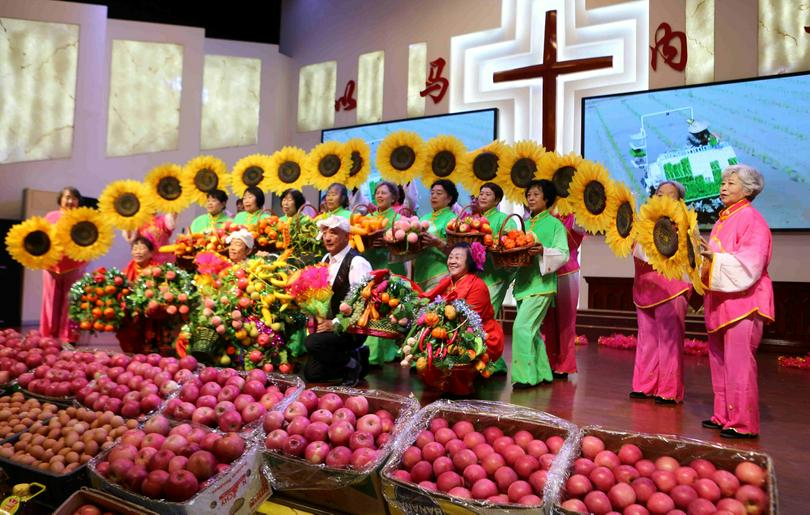In Western Christian tradition, the Harvest Festival has a long history. Originating in England's church and agrarian culture as early as the 16th and 17th centuries, churches would hold a special Harvest Sunday in autumn to thank God for the year's crops and daily provision. Worshippers decorated sanctuaries with newly harvested fruits, grains, and vegetables as offerings, symbolizing the "firstfruits" dedicated to God—an echo of the Old Testament tradition in which the Israelites presented their first produce to the Lord.
When Western missionaries came to China in the 19th century, they brought this custom with them—especially in rural areas where they established churches and schools.
The Chinese Recorder, a leading English-language periodical published by Protestant missionaries in China from 1868 to 1941, recorded multiple instances of "Harvest Thanksgiving Services" held in Chinese villages, describing how missionaries and local believers "decorated the chapel with rice sheaves and fruits" and had a thanksgiving service. Mission reports from the London Missionary Society, the Methodist Mission, and the Methodist Episcopal Mission also mention similar Autumn Thanksgiving Services.
For China's agrarian society, the spirit of such celebrations resonated deeply with local traditions of giving thanks after the harvest. As a result, this festival was easily embraced and localized by Chinese churches. Since the 1980s, with the revival of rural churches after the reopening of religious activities, the Harvest Thanksgiving Service has flourished again—now imbued with even richer Chinese cultural elements.
Today, Harvest Thanksgiving Services are held across urban and rural churches throughout China, often between September and November. Some congregations combine the service with the Mid-Autumn Festival or Double Ninth Festival, to honor the elderly, or Thanksgiving. A small number hold it as late as December, sometimes even together with Christmas celebrations.
During these services, believers decorate the pulpit with produce from their own fields. In northeastern China, the offerings are particularly abundant, featuring grains, oil, fruits, vegetables, and even meat products displayed before the altar.
The celebration typically takes the form of a Thanksgiving worship service, with sermons focused on gratitude, followed by a joyful praise gathering. Singing, dancing, and short performances such as storytelling, testimonies, or biblical dramas are common.
Some churches include baptisms on this day—symbolizing both a physical and spiritual harvest. In some regions, churches also hold retreats afterward, inviting pastors to share messages of renewal and thanksgiving.
In many urban churches, the festival has become a time to remember the needy. Congregations collect food or raise funds for underprivileged families. In 2017, Fuhua Church in Fuqing City, Fujian Province, held a Harvest Thanksgiving Sunday under the theme "Remembering the Poor Among You." Believers, many no longer engaged in farming, brought rice, flour, cooking oil, biscuits, and canned goods to distribute to local families in need.
In some regions, several nearby churches gather at one church to jointly hold an Autumn Harvest Thanksgiving celebration. This festival serves as a time for believers to fellowship and interact, and it is also one of the few occasions throughout the year when pastors from various places can meet.
During the annual Thanksgiving activities at the Sailin Church in Baoshan City, Yunnan Province, pastors, elders, and others gather patients in need and offer collective intercessory prayers for them. Such celebrations in Baoshan are not only popular among believers but have also been accepted by non-believers, becoming a well-liked local tradition.
Among ethnic minority Christians, the festival carries distinctive local expressions. Li Xin, a scholar at Yunnan University, documented the Harvest Thanksgiving Festival of the Miao church in Bajiaoqing village, Pu'er city, Yunnan Province, in China Religion (January 2011 issue). The Miao community there celebrates two thanksgiving events each year: the "Minor Spring Thanksgiving" around April or May, following the wheat and broad bean harvest, and the "Major Spring Thanksgiving" or Autumn Harvest Thanksgiving in the tenth lunar month, after the main crops like corn and potatoes are gathered.
While the minor celebration is held within the local congregation, the larger one draws believers from surrounding counties, often attracting thousands of participants. Churches typically exchange invitations two or three weeks in advance, sending out and receiving letters from neighboring congregations to join one another's Thanksgiving festivals. After the harvest season, attending Thanksgiving festivals in nearby churches becomes one of the community's favorite activities.
Local ethnic minorities primarily express their worship of Jesus through hymn-singing. On the day of the Thanksgiving celebration, hymn singing continues from beginning to end, interspersed only by short moments of prayer, Bible reading, or preaching. Each visiting church choir performs at least two hymns, and collective singing can take up to 80% of the entire ceremony, turning the thanksgiving gathering into a grand choral worship event.
In 2018, China established the "Chinese Farmers' Harvest Festival," celebrated annually on the Autumn Equinox. Some Christians have suggested aligning church Harvest Thanksgiving Services with this national festival. This practice has already been adopted by some churches. On September 22 last year, the Jiaodong Christian Church in Jiaozuo City, Henan Province, held a 2024 "Chinese Farmers' Harvest Festival" Thanksgiving worship event to celebrate the joy of the harvest.
After more than a century of adaptation and local development, the Harvest Thanksgiving Service has evolved into one of the most uniquely Chinese Christian festivals. While its roots trace back to Western missionary tradition, its spirit, form, and meaning have been deeply reshaped by Chinese believers.












